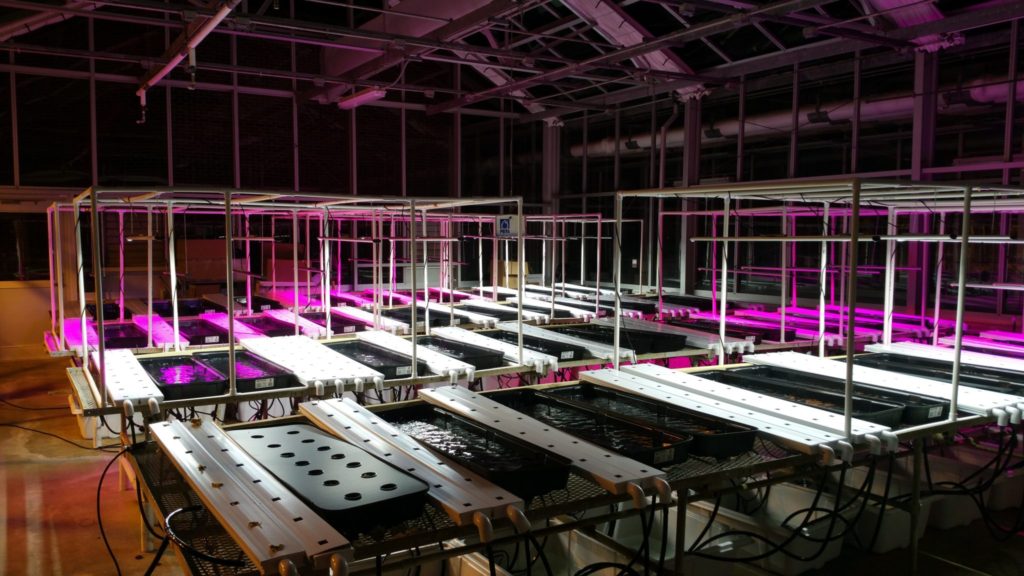
Purdue University will develop research based and Indiana region-specific information for hydroponic lettuce production in greenhouses and transfer crop production and marketing knowledge to Indiana farmers through effective extension education. Specifically, (i) the proposed research will develop region-specific information by conducting research on the performance of different leaf lettuce varieties for increased productivity, quality and tolerance to temperature stress, measuring the benefits of using supplemental lighting in winter, and developing best nutrient management practices for hydroponic lettuce production in greenhouses and (ii) effectively disseminate and educate beginner and experienced growers using extension methods including workshops, field visits and conferences on best production and marketing strategies for increased year-round profits.
Economic Research Service of USDA (2016) published that annual per capita consumption of lettuce in the US was 24.5 lb. with an average price of $0.45 per lb. in 2015. With a population of approximately 6.6 million in Indiana, the overall estimated annual consumption of lettuce is 161 million lb. and valued at $73 million. In 2014, the value of lettuce grown in Indiana was only $406,000 or an estimated production of 0.89 million lb. (based on $0.45/lb.). In other words, most of the lettuce consumed in Indiana was imported from other states. This data suggests an alarming loss in income to Indiana growers (approximately $72.5 million) that can be potentially realized by growing more lettuce within the state. The gap is mainly due to slow growth of the industry, which can be related to lack of region-specific research information and production knowledge among farmers. The proposal directly address the gap by conducting research to develop region-specific information on hydroponic lettuce production and training beginner and experienced growers through extension programs.
Research: The purpose of the proposed research is to develop region-specific research information that enhances competitiveness of Indiana growers. Four separate experiments will be conducted in the greenhouse using a custom- built hydroponic system: Exp. 1: Currently no information exists on comparative performance of different varieties and optimal fertilizer concentration for varieties. Seasonal effect on varietal performance and optimal nutrient solution concentration for increased productivity and nutritional quality of lettuce varieties will be tested. Exp. 2: Greenhouse heating costs are extremely high during winter in Indiana. We will evaluate cold temperatures stress tolerance of popular lettuce varieties grown in Indiana with a view to reduce heating costs of production, Exp. 3: Current approach in hydroponics involve recycling fertilizer solution without properly maintaining nutrient balance. We plan to develop better approaches to maintaining nutrient concentration in the fertilizer solution. Exp. 4: No information exists about profitability of adding supplemental light during winter for hydroponic lettuce production in Indiana. Effect of different supplemental lighting treatments on lettuce productivity, nutritional quality and profitability will be tested.
Extension: The proposal aims to increase the knowledge level, competitiveness and profits for Indiana farmers involved in hydroponic lettuce production by transferring research based region-specific information through extension education. A recent onsite survey conducted by us during a workshop on hydroponic lettuce production at Purdue University indicated that majority of participants (beginner farmers) lacked sufficient knowledge on hydroponics. The proposed extension program comprises of three components: (i) In-depth class-room style hands-on training in the form of workshops to 100-150 farmers at the Purdue University campus on best production practices, marketing strategies, regulatory policies and benefits of Indiana Grown certification, (ii) Organizing field visits for participant farmers to select greenhouses in Indiana, and (iii) Transferring knowledge to large groups by presenting research-based information at three conferences that are organized at different locations in the state (Illiana Vegetable Growers Symposium, Indiana Horticulture Congress and Michiana Vegetable Growers Symposium).